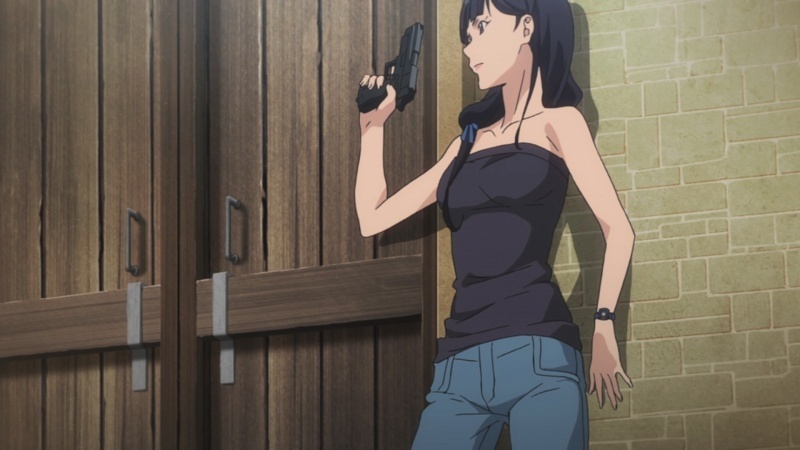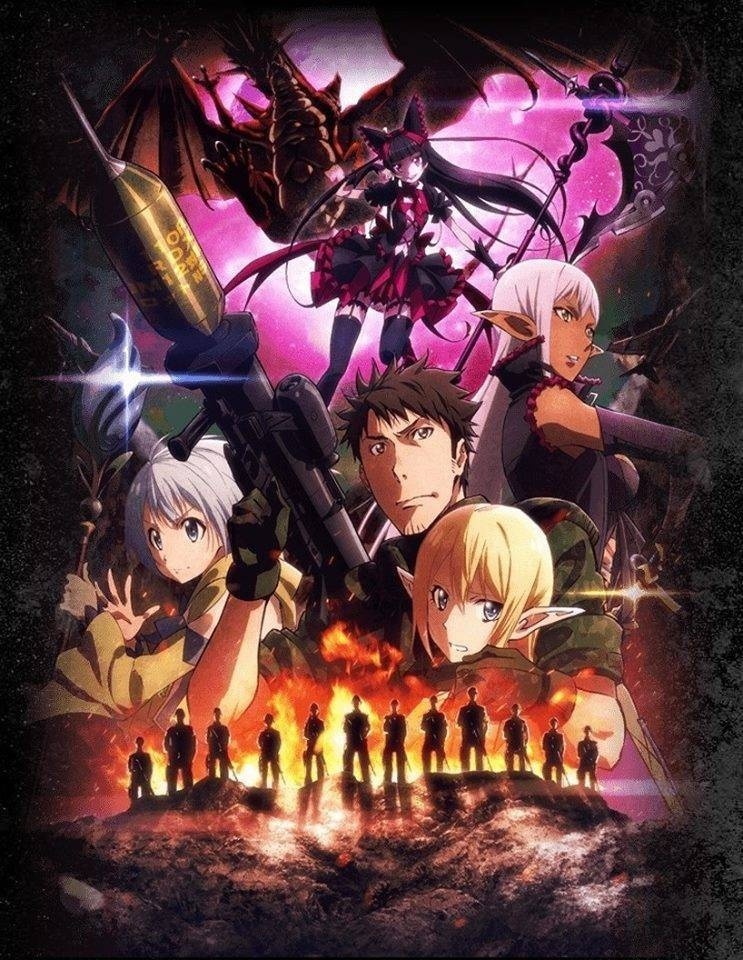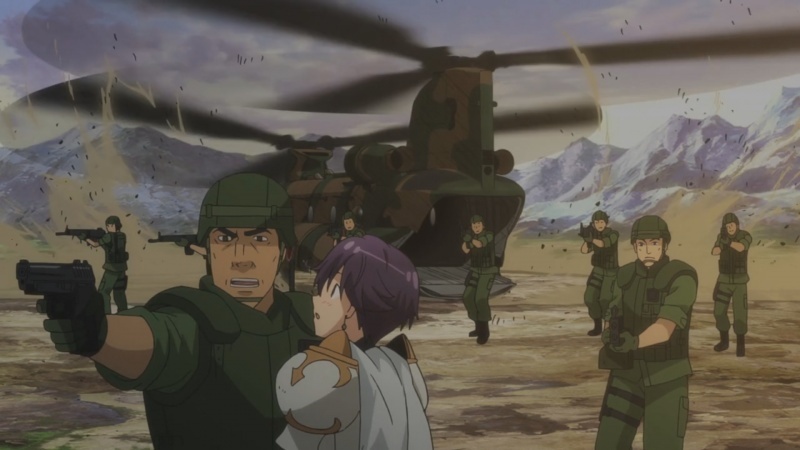
Gate - Thus the JSDF Fought There! (UK Rating: N/A)
It was a dark time in sci-fi history. It had been quite a while since the last Star Trek show had aired and pickings on prime-time tended to be slim. There was plenty of violence, plenty of weird shows, but most were niche, until a new show came along. Through a mysterious, and long-since-forgotten gate between worlds, a mysterious force appeared, striking hard and fast, taking innocents by force, before retreating beyond the gate once more. A modern military expedition gets mounted with the intent of both retrieving them and exploring this strange new world beyond the gate. That show… was Stargate SG-1, starring Richard Dean Anderson, Michael Shanks, Amanda Tapping, and Christopher Judge. It lasted over 10 seasons, spawned two side-shows, and then faded into memory.Someone over in Japan apparently saw that show and felt that they could make their own light novel take on it, despite only watching the first episode or the movie… then made that light novel into a manga, and then a movie.

This is, of course, just playing things up for comedic effect here, since obviously stories can have similar ideas yet not be rip-offs and, even if they are, it's each author's own individual take upon the series and story that makes it original. Therefore, even if author Takumi Yanai was inspired by Stargate SG-1, he took it in a wildly different direction, and it shows.
The story is simple enough. One day in Tokyo, everything is going nice and peachy. Children are having fun, otaku fans are playing Not!Dragon Quest, citizens are happily crossing streets, and the smurfberries are coming in beautifully, while the evil Gargamel is off plotting, when something changes. A mystical temple, resembling one of ancient Greek origin, pops into the middle of the street and an army straight out of medieval fantasy stories rushes in equipped with fine metal armour, monsters, dragons, and the like. Easily destroying what little resistance can be found, they rip through the undefended civilians. Until the SWAT/military arrive and show that Legolas' kill count in Helm's Deep was pathetic compared to what a modern assault rifle could manage.
With the world beyond the gate now open, it's up to Yoji Itami, one of the 'civilians' whose quick action resulted in the saving of many lives turned him into a hero, to serve as one of the lead scouting units ready to explore this strange new world and try and broker peace while the Japan Self Defence Force holds the gate. Meanwhile, the Empire is up in arms. It's been ages since it was so completely trounced and now its politicians and subjects are getting riled up, chomping at the bit to try and cause trouble, all while a humble scouting squad is making its rounds.
On the surface, Gate - Thus the JSDF Fought There! seems to be a great idea as it provides a chance to see questions people have likely asked before finally play out. Just how effective would a modern rifle be against an ancient army? Would a jet be able to really stand up to a dragon? Why isn't my Miqo'te Machinest in Final Fantasy XIV one of the deadliest forces of nature despite having basically magical semi-automatic rifles? Then the primary problem of the anime shows up.
It's not about that. Instead it's about Yoji going around being a standard hero. It's not about fantasy vs. technology. It's not about a journey of self-discovery, exploration, or anything like that. It's about how the JSDF is awesome and people who disagree are likely corrupt politicians. The real tragedy is that it could have done this. It could have worked… but it feels like a third of each episode is missing.
Here's the primary issue: all the interest, all the intrigue, all the things that would hold a plot together for a prolonged period of time are on the Empire's side of things, while the focus is on the JSDF and Yoji. Fairly early on, for example, one of the characters from the other side of the gate gets to speak in Japan in front of several important international diplomats aired across the world. This character, Rory Mercury, is an apostle of Emroy, a god of death, war, crime, and madness. Throughout the series, she's shown a direct connection with her god up to (as shown very soon after) literal immortality. She works on the battlefield channelling the souls of the dead into the afterlife. When one of the reporters tries to corner her and get her to provide an image of the JSDF as cowards, she delivers an applause-worthy retort that firmly puts the reporter in her place and cements her status as a demigod.

The stage is set. There is a literal demigod in the world whose abilities can be tested. Just beyond the gate there is a real world in which the gods can directly interact. They may even be able to intercede over in this world now because of the gate. World religions now may hold a merit of truth or can be outright disproven as lies while atheism is proven categorically 100% wrong in less than a minute or at least in serious need of rethinking. What happens? Soon after there is a scene of Rory trying to hit on Itami at a hot-spring while a group of JSDF soldiers with squad designations named after Fate/Stay Night manage to stave off US, Chinese, and Russian special ops forces.
Meanwhile, in the Empire, there are the various senators trying to push their own agendas as things become more and more divided, and some start to favour peace since every battle has been a resounding failure and the public has become more and more interested in Japanese luxury goods, medical services, and economic opportunities offered via trade beyond the gate. A rift between the increasingly popular princess who favours the JSDF and the crown prince, whose support was with them, is further dividing the people. Guess what plot-line is more interesting
While there are several spoiler-heavy instances later on, one of the most resounding examples happens right when the JSDF goes through. It seems like its time for a major showdown as the Imperial army is on the other side, while the JSDF is just getting set up. Reserves are being called in from the Empire. Even if the JSDF wins, now is the time to showcase that this enemy is at least a capable threat. Then the fights are just skipped past with a screen posting a death-toll at the end.
In Stargate SG-1, the USAF struggled even though its forces won most of its engagements. The Goa'uld was not used to dealing with actual resistance groups, much less ones favouring the squad-based gun tactics focused on efficiency that the Stargate teams used. They used intimidation and army formations, but even if the Stargate teams won most of their battles, the Goa'uld seemed to always have some edge and one of the best ways to win was to play to the arrogance and political bickering against each other. Something that, while technological, could also fill the same gap, magic or whatever else Gate had offered. The side-characters that do get development are not the ones from the JSDF but the Empire, whom get less screen time. Battles, intrigue, and plot-lines that feel like they should take up much more time seem to pop up and get resolved swiftly, or dropped altogether before long.

That's the most frustrating thing about Gate - Thus the JSDF Fought There! It's got a great idea, but when more screen-time, build-up, and development can be devoted to Itami dealing with the bane of micro-transactions in the very first episode than entire battles, the impact that the new connection will have on the worlds is seen only from the side of the Empire and only barely touched on for our side, and the focus seems to switch between some political intrigue and a harem, it becomes clear what Gate really is. It's another dime-a-dozen fantasy harem anime with guns replacing whatever magic/mystical power/whatever that would be found elsewhere.
What does it do right, then? Well…when it actually tries it can be interesting! Several incidents, characters, and the like, hold interest and intrigue. Multiple implications could be expanded on. When it does focus on some characters, such as Sherry, one of the daughters of the Empire politicians, it becomes interesting, and it even holds a few tense moments, as well as some moments that will make you want to at least be invested and glad you were.

 Sign In
Sign In 20.08.2016
20.08.2016
 Subscribe to this topic
Subscribe to this topic Features
Features





 Top
Top

